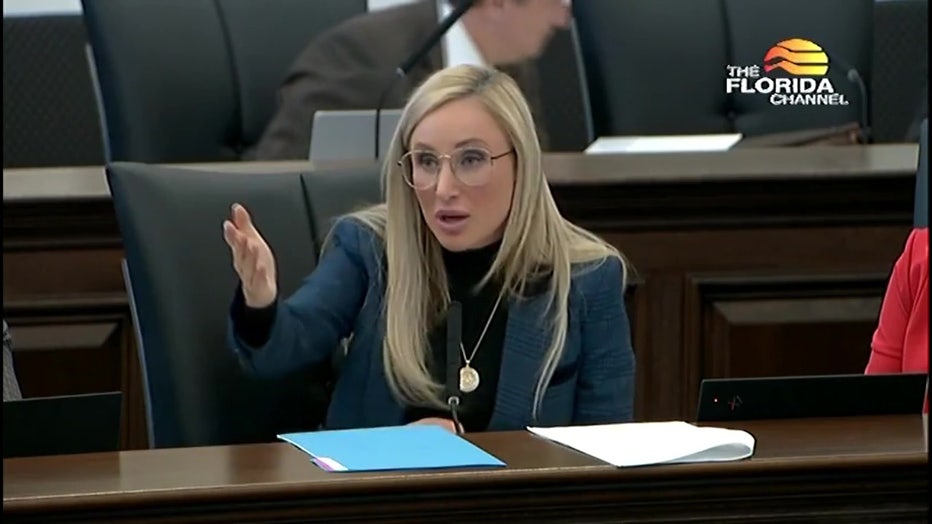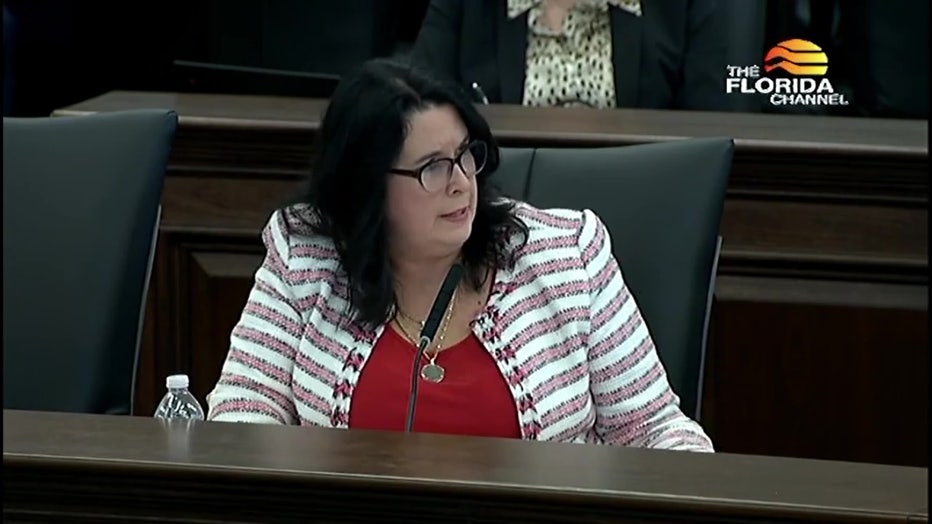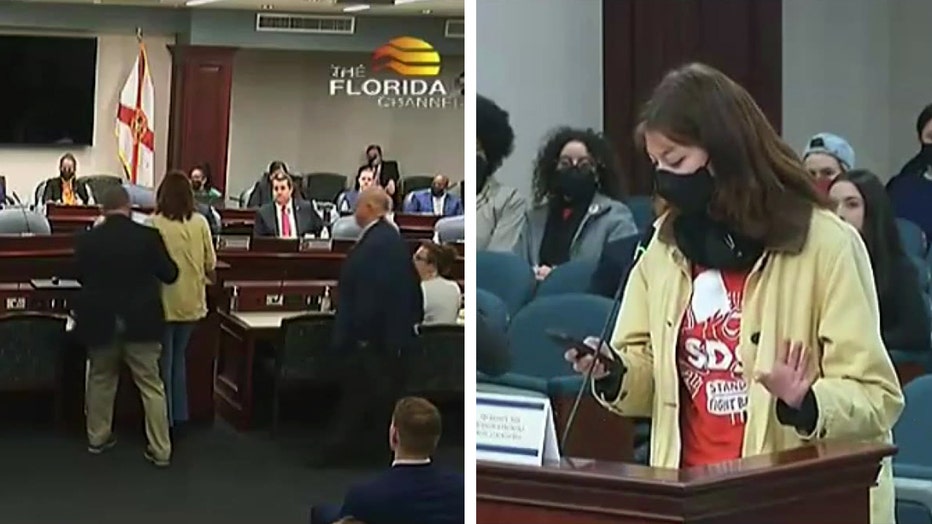Florida bill banning abortion after 15 weeks advances without exclusions for rape, incest
TAMPA, Fla. - A bill that would ban abortions after 15 weeks of pregnancy cleared another hurdle Wednesday after being approved by Florida Senators in a 6-4 party line vote.
The bill is modeled after a Mississippi 15 week abortion law that is currently being debated by the US Supreme Court as a challenge to the landmark 1973 Roe v. Wade decision.
If passed, women and girls in Florida would have up to 15 weeks, instead of 25 weeks, to decided to terminate a pregnancy, even in cases of rape and incest.

More coverage: Florida teen wins appeal for right to abortion without parental consent
A Tampa teen has won her appeal in district court for the right to talk to a doctor about, and ultimately have a medical abortion without parental consent. Her original request was denied by a judge, based partially on "either a lack of intelligence or credibility."
What's in Florida HB 5 and SB 146
HB 5 and its companion bill SB 146 allow for exceptions in cases where a fetal abnormality exists that would cause death before or shortly after birth, or if the mother's life is at risk. The exceptions would require two doctors to agree on the outcome before the exception could be granted.
The bill does not, however, include exceptions in cases of rape, incest, or human trafficking. Attempts to include such an exception have been twice voted down by the House and Senate.
"It's painful to know and understand that not having an exception like this would put women on the clock and continue to take power and control away from them. That’s what their abusers have done," said Sen. Lauren Book, (D-Plantation).

Sen. Lauren Book, (D-Plantation)
Book, a survivor of sexual assault, proposed a failed amendment that would have allowed victims of rape, incest or human trafficking to obtain an abortion beyond the 15-week mark.
The bill's language defines the 15-week time frame as beginning on the first day of a person's last menstrual period, not at the estimated date of conception or discovery of pregnancy.
Bill sponsor defends shorter timeframe
Bill sponsor Sen. Kelli Stargel (R-Lakeland) said she believes "life begins at conception" and argues 15 weeks is plenty of time for a pregnant person to decide.
"I believe strongly that these are babies in women’s wombs and I want to protect them," Stargel said. "With this bill, you've got 15 weeks. Most people recognize after their last missed period that they're pregnant, maybe at the most two to three weeks after that. This gives it a little bit more time for someone who's maybe inconsistent."

Sen. Kelli Stargel (R-Lakeland)
According to the state Agency for Health Care Administration, abortions performed in the second trimester, which the state of Florida defines as between weeks 12 and 23 of pregnancy, are rare.
Of the 74,756 total abortions in 2021, 4,491 were performed in the second trimester.
According to state data, reported cases of rape accounted for 111 abortions in 2021. Eight abortions were reported due to incest. Of those, 14 rape victims and three incest victims terminated their pregnancies in the second trimester.
RELATED: Tampa teen wins right to abortion without parental consent
Despite small amounts of publicly-available data, Stargel said she believes victims of incest or human trafficking were more likely to be pressured into an abortion by their abusers early on.
"When you're talking about sex, human trafficking and incest, I would submit that the majority of girls who unfortunately get pregnant due to incest are possibly forced to have the abortion because the person who's doing the incest would rather not have the evidence and the DNA of that horrific crime be evidence and used against them for what they've done," said Stargel.
The viability argument
Stargel says her bill will help protect potentially viable lives. She cites two cases where infants had survived after being born at 21 weeks.
As noted in a study published in "Pediatrics" regarding one infant born at 21 weeks, in 2014, both obstetric and pediatric societies recommend against assessing for viability or attempting resuscitation before 22 weeks gestation.
The Mayo Clinic classifies babies born at or before 25 weeks as extremely preterm and notes they often experience a series of serious medical complications if they survive.
RELATED: DeSantis signals support for ban on abortions after 15 weeks in Florida
Stargel says she chose 15 weeks because she believes that is a point at which a fetus can feel pain.
"At that point in development of the baby they have the ability to feel pain," said Stargel.
But a fetus’ ability to feel pain is a highly contested claim that was refuted by doctors who testified at Wednesday’s hearing.

How SCOTUS ruling on abortion could impact Florida
As the Supreme Court of the United States hears its most significant abortion case in a generation, many around the country wonder how the ruling could impact women's rights in their state.
"According to the medical research The brain is not developed until the third trimester in order to perceive pain," said Dr. Samantha Deans, Associate Medical Director for Planned Parenthood of Southeast and North Florida.
A letter sent to the Senate Committee, signed by more than 450 doctors and healthcare professionals from across the state of Florida, called the 15-week limit "arbitrary" and an "alarming attempt to insert politics into the patient clinician relationship."
Vocal opposition
During a House hearing on the bill last week, Chairperson Bryan Avila (R-Miami Springs) announced he would cut public comment short after less than 30 minutes of testimony. Members of the public then began shouting, causing the hearing to be put on hold.
University of South Florida Student Gia Davila was at the podium at the time. As she began to speak, she was ushered out while fellow activists from Students for a Democratic Society chanted "let her speak!"

USF student Gia Davila escorted from podium during hearing over 15-week abortion ban
After law enforcement cleared the public from the room, the meeting resumed. Eventually, members of the public were allowed back into the room as lawmakers debated then passed the bill – with all Republicans voting in favor and Democrats voting against.
"Access to reproductive health care can already be pretty limited especially for students who live on campus, low income students, students of color," said Davila. "[Abortion] is already restricted enough. These policies don't stop people from having abortions. They stop people from having safe abortions."
The bill has already cleared two House committees and its first Senate committee. It could be brought up again next Wednesday in the Senate Appropriations Committee.
Governor Ron DeSantis has indicated he would be supportive of a 15-week limit on abortion.


